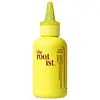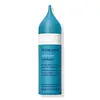What's inside
What's inside
 Key Ingredients
Key Ingredients

 Benefits
Benefits

 Concerns
Concerns

 Ingredients Side-by-side
Ingredients Side-by-side

Aloe Barbadensis Leaf Juice
Skin ConditioningLactobacillus
Skin ConditioningCentella Asiatica Extract
CleansingCoffee Seed Oil PEG-8 Esters
EmollientGanoderma Lucidum Ferment Filtrate
HumectantPanax Ginseng Root
EmollientScutellaria Baicalensis Root Extract
AstringentPisum Sativum Extract
Skin ConditioningAspergillus/Lactobacillus/Rice Seed Extract Ferment Filtrate
EmollientArginine
MaskingGlycolic Acid
BufferingLactic Acid
BufferingWater
Skin ConditioningVinegar
Glycerin
HumectantPolyglyceryl-4 Caprate
EmulsifyingPentylene Glycol
Skin ConditioningHibiscus Sabdariffa Flower Extract
Skin ConditioningInulin
Skin ConditioningGlucomannan
Skin ConditioningAlpha-Glucan Oligosaccharide
CleansingSarcosine
Skin ConditioningMentha Viridis Leaf Oil
AstringentMentha Piperita Oil
MaskingDecyl Glucoside
CleansingSclerotium Gum
Emulsion StabilisingButylene Glycol
HumectantPotassium Hydroxide
BufferingCitric Acid
BufferingPotassium Sorbate
PreservativeSodium Benzoate
Masking1,2-Hexanediol
Skin ConditioningLimonene
PerfumingAloe Barbadensis Leaf Juice, Lactobacillus, Centella Asiatica Extract, Coffee Seed Oil PEG-8 Esters, Ganoderma Lucidum Ferment Filtrate, Panax Ginseng Root, Scutellaria Baicalensis Root Extract, Pisum Sativum Extract, Aspergillus/Lactobacillus/Rice Seed Extract Ferment Filtrate, Arginine, Glycolic Acid, Lactic Acid, Water, Vinegar, Glycerin, Polyglyceryl-4 Caprate, Pentylene Glycol, Hibiscus Sabdariffa Flower Extract, Inulin, Glucomannan, Alpha-Glucan Oligosaccharide, Sarcosine, Mentha Viridis Leaf Oil, Mentha Piperita Oil, Decyl Glucoside, Sclerotium Gum, Butylene Glycol, Potassium Hydroxide, Citric Acid, Potassium Sorbate, Sodium Benzoate, 1,2-Hexanediol, Limonene
Water
Skin ConditioningPropanediol
SolventMandelic Acid
AntimicrobialGlycolic Acid
BufferingGluconolactone
Skin ConditioningIsopentyldiol
HumectantPPG-24-Glycereth-24
EmulsifyingSaccharide Isomerate
HumectantMethyl Diisopropyl Propionamide
MaskingGaultheria Procumbens Leaf Extract
PerfumingAgave Tequilana Leaf Extract
AstringentBeta Vulgaris Root Extract
Skin ConditioningPentylene Glycol
Skin ConditioningPPG-26-Buteth-26
Skin ConditioningBetaine
HumectantGluconic Acid
Lysolecithin
EmulsifyingSclerotium Gum
Emulsion StabilisingCitric Acid
BufferingPullulan
Cellulose Gum
Emulsion StabilisingXanthan Gum
EmulsifyingHydroxyacetophenone
AntioxidantPEG-40 Hydrogenated Castor Oil
EmulsifyingSodium Citrate
BufferingSodium Benzoate
MaskingSodium Hydroxide
BufferingParfum
MaskingLimonene
PerfumingWater, Propanediol, Mandelic Acid, Glycolic Acid, Gluconolactone, Isopentyldiol, PPG-24-Glycereth-24, Saccharide Isomerate, Methyl Diisopropyl Propionamide, Gaultheria Procumbens Leaf Extract, Agave Tequilana Leaf Extract, Beta Vulgaris Root Extract, Pentylene Glycol, PPG-26-Buteth-26, Betaine, Gluconic Acid, Lysolecithin, Sclerotium Gum, Citric Acid, Pullulan, Cellulose Gum, Xanthan Gum, Hydroxyacetophenone, PEG-40 Hydrogenated Castor Oil, Sodium Citrate, Sodium Benzoate, Sodium Hydroxide, Parfum, Limonene
 Reviews
Reviews

Ingredients Explained
These ingredients are found in both products.
Ingredients higher up in an ingredient list are typically present in a larger amount.
Citric Acid is an alpha hydroxy acid (AHA) naturally found in citrus fruits like oranges, lemons, and limes.
Like other AHAs, citric acid can exfoliate skin by breaking down the bonds that hold dead skin cells together. This helps reveal smoother and brighter skin underneath.
However, this exfoliating effect only happens at high concentrations (20%) which can be hard to find in cosmetic products.
Due to this, citric acid is usually included in small amounts as a pH adjuster. This helps keep products slightly more acidic and compatible with skin's natural pH.
In skincare formulas, citric acid can:
While it can provide some skin benefits, research shows lactic acid and glycolic acid are generally more effective and less irritating exfoliants.
Most citric acid used in skincare today is made by fermenting sugars (usually from molasses). This synthetic version is identical to the natural citrus form but easier to stabilize and use in formulations.
Read more about some other popular AHA's here:
Learn more about Citric AcidGlycolic Acid is arguably the most famous alpha hydroxy acid (AHA) with tons of research backing its benefits.
It is found naturally in sugar cane but the form used in skincare is usually synthetic for purity and stability.
Glycolic acid removes the top layer of dead skin cells to allow newer and fresher ones to emerge.
AHAs work by breaking down the structural “glue” that holds old skin cells in place. When that buildup is gone, your skin can renew itself more efficiently.
Research also shows glycolic acid stimulates collagen production, helping to firm and thicken the skin over time. This is one of its biggest advantages over other AHAs.
Overall, glycolic acid helps with:
Fun fact: Glycolic acid boosts skin hydration by helping it produce molecules that increase hyaluronic acid naturally.
To work best, glycolic acid products should have a pH between 3-4 (that’s where exfoliation is most effective but still gentle on skin).
The pH and concentration of a product are key to its effectiveness:
It is normal to feel a slight stinging sensation when using glycolic acid. This usually fades as your skin adjusts.
Because glycolic acid has the smallest molecular size in the AHA family, it can penetrate deeper, which enhances its effectiveness but also makes it more likely to irritate sensitive skin.
If your skin is very sensitive or prone to rosacea, glycolic acid may be too strong; in that case, try milder options like lactic acid or a PHA instead.
Recent studies suggest glycolic acid might even help protect against UV damage. But don’t skip sunscreen! Freshly exfoliated skin is more sensitive to the sun.
Glycolic acid is a skincare superstar. It smooths, brightens, hydrates, and firms the skin. Unless you’re highly sensitive, it’s well worth adding to your routine.
Read more about some other popular AHA's here:
Learn more about Glycolic AcidLimonene is a fragrance that adds scent and taste to a formulation.
It's found in the peel oil of citrus fruits and other plants such as lavender and eucalyptus. The scent of limonene is generally described as "sweet citrus".
Limonene acts as an antioxidant, meaning it helps neutralize free radicals.
When exposed to air, oxidized limonene may sensitize the skin. Because of this, limonene is often avoided by people with sensitive skin.
The term 'fragrance' is not regulated in many countries. In many cases, it is up to the brand to define this term. For instance, many brands choose to label themselves as "fragrance-free" because they are not using synthetic fragrances. However, their products may still contain ingredients such as essential oils that are considered a fragrance.
Learn more about LimonenePentylene glycol is typically used within a product to thicken it. It also adds a smooth, soft, and moisturizing feel to the product. It is naturally found in plants such as sugar beets.
The hydrophilic trait of Pentylene Glycol makes it a humectant. As a humectant, Pentylene Glycol helps draw moisture from the air to your skin. This can help keep your skin hydrated.
This property also makes Pentylene Glycol a great texture enhancer. It can also help thicken or stabilize a product.
Pentylene Glycol also acts as a mild preservative and helps to keep a product microbe-free.
Some people may experience mild eye and skin irritation from Pentylene Glycol. We always recommend speaking with a professional about using this ingredient in your routine.
Pentylene Glycol has a low molecular weight and is part of the 1,2-glycol family.
Learn more about Pentylene GlycolSclerotium Gum is a polysaccharide gum made by the fungus, Sclerotium rolfssii. It is similar to xanthan gum.
In cosmetics, Sclerotium Gum is used to thicken the texture and to help stabilize other ingredients.
As an emulsifier, Sclerotium Gum helps prevent ingredients from separating, such as water and oil.
Learn more about Sclerotium GumSodium Benzoate is a preservative. It's used in both cosmetic and food products to inhibit the growth of mold and bacteria. It is typically produced synthetically.
Both the US FDA and EU Health Committee have approved the use of sodium benzoate. In the US, levels of 0.1% (of the total product) are allowed.
Sodium benzoate works as a preservative by inhibiting the growth of bacteria inside of cells. It prevents the cell from fermenting a type of sugar using an enzyme called phosphofructokinase.
It is the salt of benzoic acid. Foods containing sodium benzoate include soda, salad dressings, condiments, fruit juices, wines, and snack foods.
Studies for using ascorbic acid and sodium benzoate in cosmetics are lacking, especially in skincare routines with multiple steps.
We always recommend speaking with a professional, such as a dermatologist, if you have any concerns.
Learn more about Sodium BenzoateWater. It's the most common cosmetic ingredient of all. You'll usually see it at the top of ingredient lists, meaning that it makes up the largest part of the product.
So why is it so popular? Water most often acts as a solvent - this means that it helps dissolve other ingredients into the formulation.
You'll also recognize water as that liquid we all need to stay alive. If you see this, drink a glass of water. Stay hydrated!
Learn more about Water